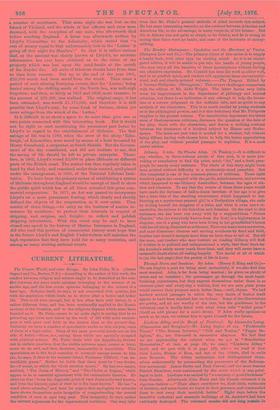Gilmory. 3 vols. By Pho3be Allen. (S. Tinsley.)—It is difficult
to say whether, in three-volume novels of this sort, it is more pro- voking or consolatory to find big print, much "fat," and a fresh para- graph for nearly every sentence. The whole of this story might have been printed without difficulty in a moderately-sized pamphlet. But this complaint is one of the common-places of criticism. These eight hundred pages are occupied with the perils, misadventures, and sorrows which happened to one Gilmory Anstruther, between the ages of six- teen and, nineteen. To say that the events of those three years would have made the fortunes of half-a-dozen heroines of her age is to give but a faint idea of the startling occurrences which happened to her. Starting as a mysterious peasant girl in a Derbyshire village, she ends by finding herself the daughter of a duke, and what is even more re- markable, the heiress to his dukedom and domains. On the road to this eminence, she has been run away with by a supposititious "Prince Charlie," who (as everybody knows from the first) is a highwayman in disguise, one of a gang who have been living in her grandfather's house with her all along, disguised as noblemen. There are many more mysteries, and most disastrous chances and moving accidents by flood and field, besides hair-breadth escapes more than we have time to tell of. But all the same, any readers who may venture on reading Gilmory will find it written in so pellucid and unimpassioned a style, that their fears for the heroine's safety never reach fever-heat, and they will never have a moment's doubt about all ending happily. The moral of all of which is (on the last page) that the poetry of life is Love.


































 Previous page
Previous page